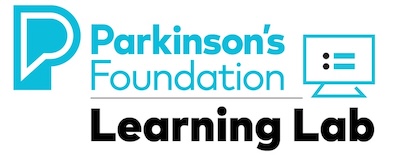
The Parkinson’s Foundation Education Series for Community Providers is designed to improve treatment and outcomes for people with Parkinson’s disease (PD).
Most people with Parkinson’s do not have access to neurologists or movement disorders specialists or instead, choose to see other healthcare professionals for PD care. This series of courses will:
- Help healthcare professionals better understand how to care for people with Parkinson’s from diagnosis to management.
- Enhance healthcare professionals’ understanding of the roles of interprofessional healthcare team members involved in developing customized care plans for people with Parkinson’s
- Highlight the significance of interprofessional communication and coordination to deliver optimal Parkinson’s care
To help healthcare professionals deliver culturally competent, high-quality Parkinson’s care, the Parkinson’s Foundation, with support from the CVS Health Foundation, developed a free series of asynchronous online accredited courses that offer valuable information to those who care for people with Parkinson’s.
Each course is designed to be easily accessed in segments, at your convenience - whether you are watching on your computer or listening on-the-go.
Target Audience
Courses are designed for the following healthcare professionals, especially those who work in medically underserved areas to improve treatment and patient outcomes through an interprofessional lens.
- Physicians
- Physician Assistants
- Nurses
- Pharmacists
- Psychologists
- Social Workers
- Community Health Providers
What is a medically underserved area or population?
These are areas or populations designated by the Health Resources & Services Administration (HRSA), an agency of the U.S. Department of Health and Human Services, as having too few primary care providers, high infant mortality, high poverty or a high elderly population.
Courses
The following courses in the series are easily accessible in bite-sized segments — view or listen at your convenience!
> Fundamentals of Parkinson's for Professionals
Introductory short course for healthcare professionals addresses PD symptoms, diagnosis, treatment and the significance of their role as members of the interprofessional care team.
> Utilizing Quality Measures to Improve Parkinson’s Care: What Every Neurologist Needs to Know
This course will focus on quality measures for neurologists, who may not primarily be focusing on Parkinson’s to better understand and deliver optimal care in their community setting.
> The Expert Care Experience: Role of Social Workers in Caring for People with Parkinson’s
This course is designed to inform and education social workers who have a pivotal role in accessing the acute and long term needs of people with Parkinson's. As part of the interprofessional care team, social workers can direct people to the most appropriate resources and by directly providing assistance in the areas of mental and emotional health.
> The Expert Care Experience: Role of Oral Health Professionals in Caring for People with Parkinson’s
This course is designed to educate oral health professionals about the complexity of PD, such as swallowing, cognition, and motor symptoms, and recommendations for optimal oral hygiene regimen.
> The Expert Care Experience: Role of Nurses in Caring for People with Parkinson’s
This course is designed for nurses to better understand their role and how to deliver comprehensive care to people living with PD, no matter their setting.
Disclosure
Your completion of each course serves as your consent to have your anonymous data from pre- and post- quizzes and evaluations used for education research. All data from pre and post quizzes and evaluations will remain anonymous and analyzed only in the aggregate. The Parkinson’s Foundation reserves the right to utilize de-identified and aggregate pre-post quiz and evaluation data for program improvement, grant reports, abstract submission, and research purposes. As part of a research project (Principal Investigator: Ashley Paul, MD IRB# IRB00373495) we are evaluating the learner's experience, impressions and recommendations of completing online courses within the Education Series for Community Providers by the Parkinson's Foundation. For questions about the research project, please contact [email protected].

 Facebook
Facebook X
X LinkedIn
LinkedIn Forward
Forward